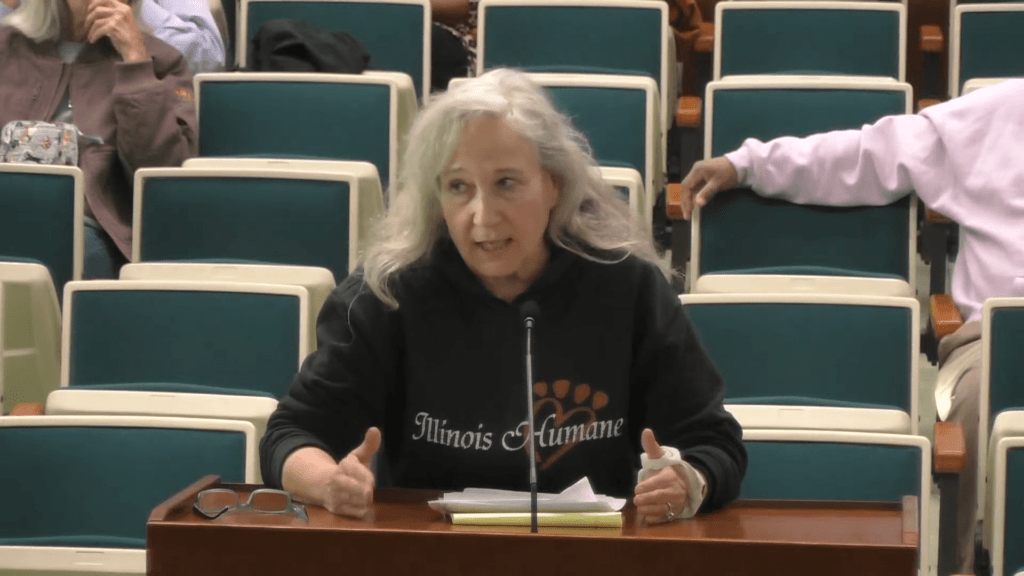During the March 27 Committee of the Whole meeting, the Springfield City Council heard the pleas of animal control experts to aid the City’s overcrowded pet shelters.
“We are drowning at Animal Control,” said Marc Ayers, Illinois Director for the Humane Society of the United States and Sangamon County board member. “Right now, there’s over ninety dogs at the facility — we’re at capacity again. We’ve been at capacity since the Pandemic ended.”
Ward 8 Alderwoman Erin Conley introduced an ordinance to amend the City code, creating a registry for individuals who breed and sell pets in Springfield. Currently, the City imposes no legal limits on animal breeding; the ordinance, the particulars of which are still under early development, primarily seeks to create a structure for collecting information on animal breeding so that the City can help to track the dramatic influx of pets into the shelter system. Whereas the State rules on animal breeding require breeders to register if they own 5 or more breeding females in their kennels, the City rules would require registration for anyone who attempts to sell from litters, even if they own only one breeding female.
An intentional side-effect of the regulation is to encourage a slowdown in the breeding numbers: by creating punishments for unregistered breeding businesses, Conley and other proponents hope to slow the pace at which Sangamon County Animal Control is receiving unwanted animals.
Alderpeople questioned why the City was being tasked with creating the rules when the facilities in question are operated by the County: Springfield employs no animal control staff and is in negotiations to renew a contract for animal control services with the County. But officials from both the City and the County confirmed that Springfield’s designation as a home rule municipality supersedes County jurisdiction.
Much of the current problem stems from the 2020-2021 quarantine period. During that period, “Twenty percent, at least, of Americans brought new pets into their homes,” explained Kaitlyn Keen, owner of KEEN on Pet Care. “But beyond that, the other part of the community [unregistered amateur pet breeders, AKA ‘backyard breeders’] saw it as an opportunity to make money while being home.”
In a pattern playing out nationwide, many animals bought from backyard breeders end up in the shelter system after prospective owners begin to encounter the downsides of bringing animals into their homes.
“Twelve people walk in [every day], back-to-back, wanting to surrender animals. Why? ‘I don’t got time.’” explained Caitlin Graham of WILD Canine Rescue. “You name the reason — I’ve gotten puppies back because ‘It barked.’ You name the reason, you get the puppy back.”
Members of the dog breeding community expressed worries that attempting to reign in “bad actors” in the City would disproportionately harm “good actors.”
Mary Coady, who shows and breeds collies, argued that because Springfield currently rakes in millions of dollars in revenue from dog shows routinely held at the State fairgrounds, establishing a registry of breeders would damage City income and send a message that “Springfield isn’t welcoming.”
“[Responsible breeders] don’t want their dogs in a shelter […] Not to contradict Mr. Ayers, but I think that there’s probably more pits, and pitbull mixes, than there are purebred dogs in the shelters,” said Coady. “There’s several breeders in Springfield, and we try to be good citizens, and we try to pay it forward.”
“Currently there are 233 licensed dog breeders in Illinois,” Graham told the Council. “Not one of them is in Springfield, Illinois.
“All of those unlisted have anywhere from one to four breeding females in their homes. [19-20 known unregistered breeders] are Springfield guys.”
Answering uncertainty from the alderpeople about the numbers driving the shelter problem, Graham estimated that, due to the actions of only 20 known unlicensed breeders in Springfield, a staggering 900-1800 dogs are “produced” in the City annually. “That is just your backyard breeders. That has no regulation, no one’s monitoring, no ordinances, no regulations, no nothing.
“Sangamon County currently has 92 dogs; 64 pitbulls. 64 of those 92 dogs came in as strays. [137 on waitlist] We’re talking huskies, we’re talking golden retrievers, we’ve pulled poodles from there… you name it, it comes through animal control, guys.
“Rescues are upset, because we are regulated. We pay $350 a year to renew our license, and we clean up the pieces. We spent $250,000 on vet care — WILD Canine Rescue did — on all of these dogs. That’s 400 dogs we’ve adopted now. $250,000 on vet care. We pulled 12 dogs from animal control last week so that they don’t die! Our animal control cares, we need the City to care […] We’re required by law, as a rescue, to vaccinate, microchip, register the dog, and to fix that dog. Everybody on [the unlicensed list] has zero responsibility for any of their puppies.”
Ward 7 Alderman Carlson mused that, at $700-$900 per puppy, initially proposed fines in the ordinance for unregistered breeders amounted to “the cost of doing business.” Alderman Hanauer of Ward 10 felt that the task of regulating breeders would require new staff be paid to come in and do the business of enforcing a hypothetical registry.
Ward 3 Alderman Roy Williams Jr. suggested finding a way to grant authority for enforcement to the County. “Once we give them money toward their budget, we’re out of the picture and they’re handling this. Now we’re saying, ‘Oh, we’re gonna give them money plus use our own staff [to chase backyard breeders],’ and that bothers me.”
“We don’t have the resources,” stressed Ward 1 Alderman Redpath. “We’ve gotta give the County time to work on this. And if it doesn’t work, we’ll come back and talk about this again.”
But many alderpeople agreed that the conversation about the saturation of animal control facilities was necessary. Ultimately, the breeding registry ordinance was held in committee pending further amendment and negotiations with the County.











